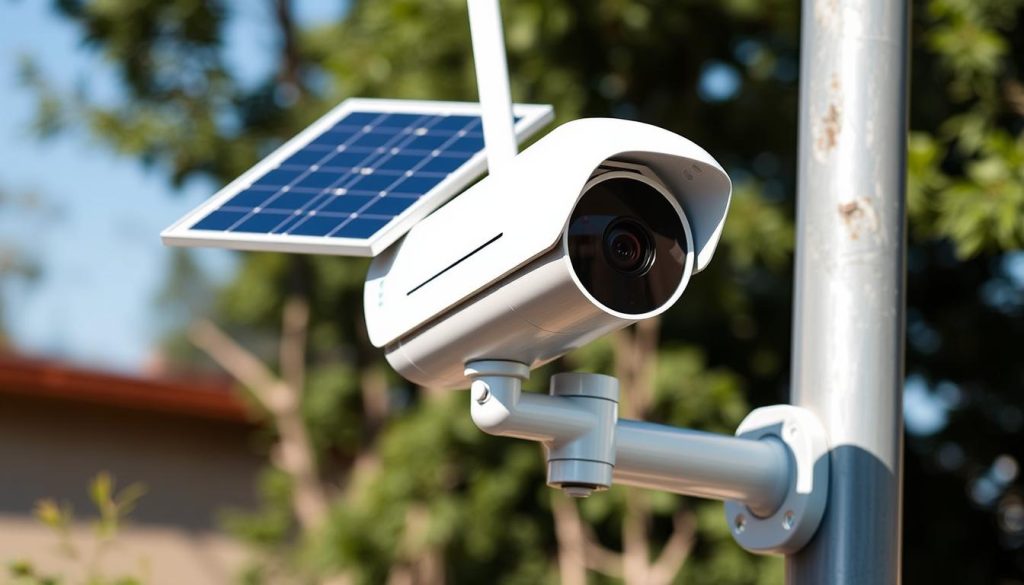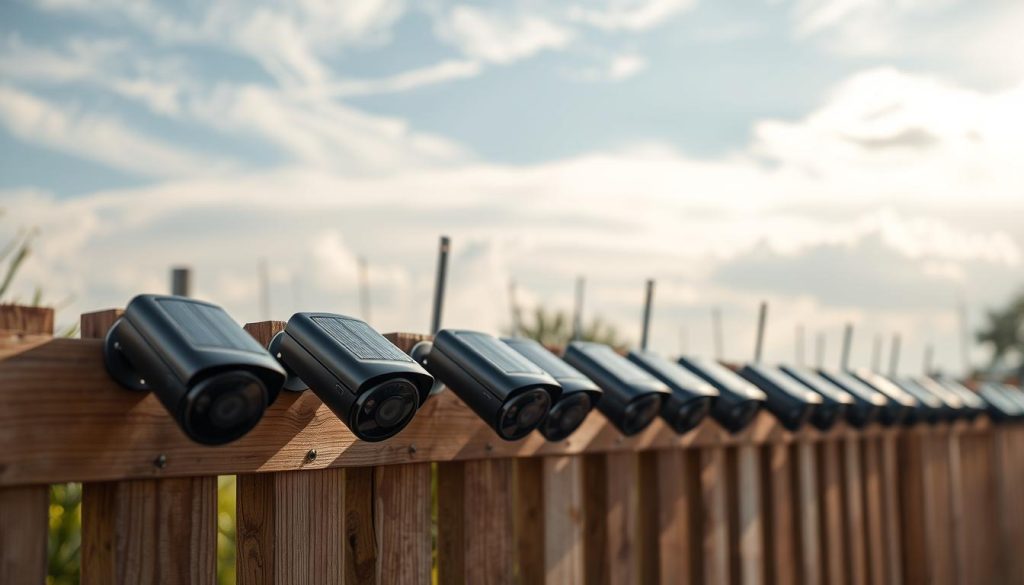Low power solar WiFi bullet cameras are becoming more popular, thanks to their efficiency. They are great for places like Singapore where they can work well outdoors. These cameras use solar energy and have long-lasting batteries, making them a green choice for security.
In this guide, we’ll look at the benefits of these solar cameras. We’ll see how they help in making camera installations more eco-friendly.
Key Takeaways
- Low power solar WiFi bullet cameras provide eco-friendly surveillance solutions.
- Solar WiFi camera batteries ensure reliable operation without high energy costs.
- Optimal camera installation can enhance the effectiveness of these systems.
- Understanding battery life is critical for maintaining camera performance.
- Solar security cameras are becoming increasingly popular in urban environments.
Introduction to Low Power Solar Cameras
Low power solar cameras are a big step forward in outdoor security. They use solar technology to charge their batteries with sunlight. This makes them perfect for places where it’s hard to get to power.
These cameras are smart and don’t need a lot of wiring or battery changes. They keep working all the time.
Many of these cameras can connect to WiFi. This lets users watch their homes from anywhere. It’s a big help for keeping places safe.
In places like Singapore, where saving the planet is key, these cameras are a great choice. They’re a green way to keep things safe.
These cameras do more than just keep things safe. They help us live in a way that’s better for the planet. They fit right in with the trend of using green tech at home and in businesses.
Understanding the Functionality of Solar WiFi Bullet Cameras
Solar WiFi bullet cameras are key in today’s security systems. They combine solar panels, rechargeable batteries, and WiFi for better user experience. These cameras do more than just take pictures; they offer remote monitoring with features like motion detection and night vision.
They send real-time alerts to your phone. This quick alert lets you act fast if something looks off. Plus, they use solar power to keep batteries charged and video streaming smooth.
Cloud storage makes it easy to watch recorded videos. This makes solar WiFi bullet cameras great for both homes and businesses. They mix advanced tech with useful features, changing how we think about security.
Components of Low Power Solar WiFi Bullet Cameras
Low power solar WiFi bullet cameras have key parts that work together well. The solar panel catches sunlight to charge the batteries. This means they don’t need electricity from the grid.
The battery part holds two 18650 batteries. This setup keeps the camera running for a long time. It’s great when there’s no power nearby.
The PIR sensor spots motion and starts the camera’s recording. It makes sure only important moments are caught. This makes the camera easy to use and effective.
Low Power Solar WiFi Bullet Camera Batteries Explained
Low power solar WiFi bullet cameras need efficient energy sources. Choosing the right solar camera batteries is key for good performance and long life. Many cameras use 18650 batteries because they are powerful and can be recharged.
Types of Batteries Used
18650 batteries are the top choice for these cameras. They are lithium-ion batteries with big benefits:
- High energy density means they last longer.
- They can be recharged, cutting down on waste and costs.
- They’re easy to find from many brands, giving users options.
Battery Efficiency and Lifespan
The efficiency of 18650 batteries affects how long they last. In the best conditions, they can go about six months on a full charge. But, the weather in places like Singapore can change this.
Keeping an eye on them and doing regular checks can help them last longer.
Benefits of Using Low Power Solar WiFi Bullet Cameras
Solar technology in surveillance systems offers many advantages. One key benefit is the big cut in electricity costs. Using solar energy means cost-effective solutions for homes and businesses, cutting out the need for expensive utility bills.
These solar cameras also help the environment. They use the sun’s power, saving energy and helping the planet. Plus, they’re easy to set up because they don’t need a lot of wiring.
These cameras also ensure reliable and ongoing security. They keep your place safe without raising your electricity bills. Their simple upkeep makes them a smart choice for modern security needs. With all these benefits of solar cameras, it’s clear why they’re becoming popular.
Installation and Setup of Solar WiFi Bullet Cameras
Getting your camera installed right is key. You need to pick the perfect spot for the best sunlight. This will make your camera work its best. Follow some simple tips to get the most out of your battery and see things clearly.
Location Planning for Optimal Sunlight Exposure
When setting up solar WiFi bullet cameras, keep these tips in mind:
- Stay away from trees, buildings, or anything that might block the sun.
- Put the camera where it gets sunlight all day, but mostly during the peak hours.
- Make sure it’s high enough for a clear WiFi signal and easy to reach for upkeep.
- Adjust the angle of panels if you have them to get more sun.

Spending time on the right spot for your camera is worth it. Choose places that get lots of sunlight. This way, you’ll have constant surveillance without a hitch.
Tips for Maintaining Battery Life in Solar Cameras
Keeping your solar WiFi bullet camera’s battery in top shape is key. Simple tips can make a big difference. They help your camera work better, even in Singapore’s changing weather.
Adjusting the motion sensor sensitivity is a smart move. It stops the camera from turning on too much. Also, cleaning the solar panels regularly is important. Dust can block sunlight, reducing the energy for charging the battery.
Checking the battery’s performance often is a good idea. This way, you can catch problems before they get worse. Keeping an eye on the voltage helps avoid sudden power losses. By following these steps, your solar camera will last longer and work better.
Factors Influencing Battery Performance
Understanding what affects battery performance is key for getting the most out of solar WiFi bullet cameras. Many things can change how long and well batteries last. Two big ones are how temperature affects them and how well solar panels charge them.
Temperature Effects on Battery Life
Temperature is very important for battery health. High heat can make batteries wear out faster. Cold temperatures can also make them less efficient. Keeping the temperature just right helps batteries work their best, making solar cameras more effective.
Charging Efficiency of Solar Panels
The way solar panels work affects battery life. To fully charge batteries, panels need lots of sunlight. The angle and any shadows can change how well panels work. Making sure panels are clear of shadows helps them charge batteries better. For more tips, check out solar WiFi camera installations.
Choosing the Right Battery for Your Solar WiFi Camera
Choosing the right battery for your solar WiFi camera is key. You need to look at several factors for the best performance. High-capacity batteries, like 18650 models from trusted brands, offer long-lasting and reliable power.
It’s important to pick batteries that match your camera model. Not all batteries work with every device. Always check the manufacturer’s recommendations to avoid problems.
Low-quality batteries can harm your camera’s performance. They might make your security camera less effective. Quality batteries keep your solar WiFi camera working well.
In short, picking the right battery means knowing your camera’s needs. Look at capacity, brand, and compatibility to make the best choice for lasting performance.
Low Power Solar WiFi Bullet Camera Batteries: Common Issues and Solutions
Users of low power solar WiFi bullet cameras might face several battery problems. One big issue is when the battery drains quickly, causing service interruptions. This can happen if there’s not enough sunlight for charging.
Checking the solar panel’s position and angle is key to solving this. It helps ensure it gets the most sunlight possible.
Another common problem is when the battery won’t charge, even in sunlight. This might be due to dirt or shadows on the solar panel. Keeping the panel clean and clear is a simple fix.
Connection issues can also pop up, affecting the WiFi signal. This might be due to the environment or old batteries. Moving the camera to a better spot and checking the battery can help.
By tackling these issues, users can improve their camera’s performance. They also extend its life and functionality.

